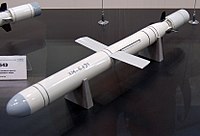3M-54 Klub
| Kalibr | |
|---|---|

export variant of missile
|
|
| Type |
Anti-ship missile Anti-submarine missile Land attack cruise missile |
| Place of origin | Russia |
| Service history | |
| In service | 2012 |
| Used by | See Operators |
| Production history | |
| Manufacturer | Novator Design Bureau |
| Produced | 2012 |
| Specifications | |
| Weight | Varies on variant, from 1,300 kg-1780 kg- 2300 kg |
| Length | Varies on variant, from 6.2 m to 8.9 m |
| Diameter | 0.533 m |
| Warhead | about 500 kg or nuclear |
|
|
|
| Engine | Multi-stage Solid-Fuel rocket, Turbojet engine for 3M-54/E/TE/E1/TE1, -14/E/TE, Solid fuel rocket for 91RE1/RTE2 |
|
Operational
range |
91RE1: 50 km |
| Flight ceiling | 1000 m |
| Flight altitude | 4.6-15 m |
| Speed | 0.8-2.5-2.9 mach |
|
Guidance
system |
Inertial guidance plus terminal Active radar homing, By satellites, DSMAC |
|
Launch
platform |
naval ships, submarines, containers, airplanes, TEL |
91RE1: 50 km
3M-54E: 220 km
3M-54E1/3M-14E: 300 km
3M-54/3M-54T: 660 km
The Russian 3M-54 Калибр (Kalibr) and 3M-14 Бирюза (Biryuza, Turqoise) (NATO codename SS-N-27 Sizzler) are Russian surface ship and submarine-launched anti-ship and coastal anti ship (AShM) and land attack cruise missiles (LACM) developed by the Novator Design Bureau (OKB-8). Derived export versions are the 3M-54E and the 3M-54E1. The 3M-54, 3M-54E, 3M-54TE and 3M-54AE have a second stage that performs a supersonic sprint in the terminal approach to the target, reducing the time that target's defense systems have to react. The 3M-54E1 only travels at subsonic speeds during its entire flight, though range is longer than that of the supersonic versions accordingly.
The name of Club is used for export versions.
The missile is a modular system with five versions: two anti-shipping types, one for land attack and two anti-submarine types. The missile is designed to share common parts between the surface and submarine-launched variants but each missile consists of different components, for example, the booster. The missile can be launched from a surface ship using a Vertical Launch System (VLS). It has a booster with thrust vectoring capability. The missile launched from a submarine torpedo tube has no need for such an addition but has a conventional booster instead. The air launched version is held in a container that is dropped and the missile launches, detaching from the container.
Kalibr land attack versions in use by Russia have various claimed maximum ranges; it is believed that the conventionally armed version has a range of 1,500 km (930 mi), while a nuclear armed Kalibr has a greater range of 2,600 km (1,600 mi).
The Russian domestic variant (3M54) and export variants (3M54E/3M54TE) fly at sub-sonic speeds while achieving supersonic speed as they near their target. They are also capable of performing very high angled defensive high speed maneuvers in contrast to the common linear flight path of other anti-ship cruise missiles.
...
Wikipedia
